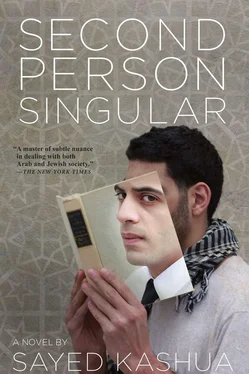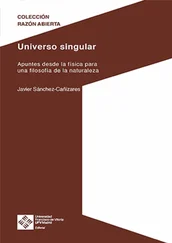The lawyer thanked Oved, paid his bill, and left the café. More than anything else he wanted to go home and kick his wife out of the house, drag her out by the hair as he’d seen them do time after time in Egyptian movies.
The bookstore was still closed but the lawyer could see the saleswoman straightening up around the register. He smoked another cigarette and waited for her to come to the door and flip the sign over. When she did, the lawyer nodded a greeting at the saleswoman, whom he’d never seen before. “Meirav’s not in today?” he asked, partly to show that he was a regular and partly so that she wouldn’t suspect him of anything, even though there was no reason for her to be suspicious.
“No,” she said, “she’s not working today.”
The lawyer went over to the area where he had found the novella. The books were still stacked on top of each other, unsorted, and the lawyer picked one up and winced when he saw the name, Yonatan, in the same spiky handwriting on the top left-hand corner of the page. He picked up another book and saw it again, Yonatan .
“Those just came in yesterday,” the saleswoman said. She walked over to him and pointed to four boxes on the floor in the corner of the store. “They only unpacked two of the boxes so far. I think there’s some great stuff in there. I’m going to unpack them and put them out today.”
“Can I look at them?” the lawyer asked.
“Sure,” the saleswoman said after a pause, “but I wouldn’t know what to charge if you wanted something.”
“You know what,” the saleswoman said, slicing open the boxes with a penknife, “look through them, and if you find something you like I’ll just call the owner and ask him how much I should sell it for.”
The lawyer bent over the first box and picked up a book, opening it slowly as though weighing its merits. He found the same name, in the same hand, on the same place in each of the books.
“There really are some great books in here,” the lawyer said without bothering to so much as read the titles. “They all from the same guy?”
“Yes,” she said, “it was a liquidation sale.”
“What does that mean?”
“It’s when someone sells their whole collection.”
“Does that happen often?” the lawyer asked, trying to smile and leave the impression of someone faintly interested.
“Absolutely,” she said, happy to talk about the book business. “Most of the books in this store are from liquidation sales, usually heirs who have no interest in keeping all of someone’s books. They call the owner of the store and he comes to the house and gives them a price for the entire collection and then they decide if they want to sell the whole thing at once or not.”
“Wow. So what you’re saying is that I’m browsing through a dead man’s library?”
“No, no, not necessarily,” she said, giggling. “A lot of people also sell before a big move.”
“Okay,” the lawyer said, checking the name on yet another book, “so now I’m dying to know who all these books belonged to.”
“I don’t know,” the saleswoman said, shrugging. “They came in during Meirav’s shift.”
“Oh,” the lawyer said, disappointed. “There really are some amazing things here.” He was trying to set the groundwork for what would be a substantial purchase. He wasn’t sure how many he could buy without making her suspicious. He wanted to tell her that he would take the whole thing, to go ahead and call the owner and ask him his price for the whole lot of them. He figured there were around two hundred books here with Yonatan’s signature and he wanted them all. He was sure that a careful inspection would reveal more of his wife’s love letters and he felt scared and yet compelled to read every one of them. He burrowed through the books, pretended to sort them, flipping through the pages and looking for more notes. At random he chose the ones he would buy and set them down on the floor and placed the others back in the box. Then he looked at the titles. Most of the volumes were prose and the rest were about drawing and photography, filled with black-and-white photographs and coal drawings. The lawyer’s heart thumped. He did not want to leave any of Yonatan’s books in the store. At any moment someone could come in, buy them, find a note written in his wife’s hand, and throw it out, thinking nothing of it.
The lawyer decided to take ten books now and come back on Sunday for ten more. By then, though, the volumes would be dispersed throughout the store, sorted by language, topic, and name of the author.
PSYCHOANALYSIS
The lawyer was hunched over his desk, boring into the ten books he had bought. He found nothing. Maybe the notes had stuck to the pages, he thought, and flipped through them again, more carefully, caressing each page with the palm of his hand, looking for little slips of paper.
His wife called in the middle of the day and the lawyer, hunting for evidence, answered her as he always did when he was immersed in a client’s case. “No, no,” he said in response to her questions, “I’m really busy right now and I won’t make it home for lunch. I don’t know when I’ll be back. No, not late. Okay, ’bye.”
Who is this Yonatan, the lawyer wondered, leaning back in his large leather chair, and why would she be writing to him in Arabic? The chances of a Jew knowing how to speak Arabic were slim, and the chances of him reading and writing the language were even slimmer. What’s more, there was not a single book in Arabic among those boxes. Yonatan was probably one of those Jews who chose to major in Arabic in high school so that he could get into a top intelligence unit in the army. But he knew it was still more likely that she would have written to him in Hebrew, since her Hebrew was perfect and there was no reason for her to make it difficult for him with her swirling, calligraphic Arabic. Unless, of course, it was part of their attraction, one of the games they played with each other, the lawyer thought, and just like that the evidence before him became personal. Maybe Yonatan is one of those Jews who’s always saying he wants to learn Arabic, and his wife, Yonatan’s lover, had decided to teach it to him the hard way. If he wanted to understand the depths of her love, he’d have to learn her mother tongue. Maybe it was a sort of seduction. Maybe they both wanted to be loved by the proverbial Other. Just a few hours earlier, the lawyer had read that thrill seeking was one of the chief causes of infidelity.
For some reason the notion that his wife’s lover was Jewish was a relief to the lawyer. A lover from a different world, who would not talk behind their backs to anyone they might know — there was no doubt that this mitigated the crime of her betrayal. A Jew, especially an Ashkenazi Jew, would just be cheating, not trampling the lawyer’s honor. A Jewish lover seemed like his wife’s problem; an Arab lover was a disgrace. “He only stole from Jews”—that was a sentence he heard often in his line of work. That’s what relatives would say when trying to prove that the arrested man was moral, because the Jews had a different set of laws and it wasn’t really theft when the property belonged to them. It didn’t even mean that much to the Jews, they said, because they were covered, they had insurance, they had savings accounts. Stealing a car from a Jew was more of a loan or a return to the original owners than a real sin that demanded punishment.
But it was also possible that her lover was an Arab like him, one who frequented used bookstores, and that he, too, had bought a book that had been signed by the same Yonatan. Or maybe it was the other way around, maybe the Jew, Yonatan, had bought a used book with no name in it and he had signed his name into a book sold to the store by the Arab lover. After all, other than the one note he had found in The Kreutzer Sonata the lawyer had not seen any evidence of correspondence. This seemed like the most likely scenario. His wife had gone out of her way to tell him about The Kreutzer Sonata. Why that book? She didn’t care about literature at all. She had said that all of her classmates in the supplementary course about psychoanalytic theory were crazy about the book, but maybe she had just said that to cover up for a slip of the tongue. Maybe, the lawyer thought, The Kreutzer Sonata had just been a favorite of her lover’s. He regretted not knowing who she had studied with, whether there were other Arabs in the class or not. The details of her professional and academic life had never seemed interesting to him and, judging by the income they generated, they had seemed more like a game than a career, a hobby that he encouraged so that she would have other things in her life aside from the house and the kids. It had to be an Arab classmate, the lawyer decided, a classmate who had heard about the book and then sold it to the bookstore, where Yonatan bought it and took it home without knowing that it held an Arabic love letter between its pages. Maybe Yonatan took the little slip of paper with the hieroglyphic letters and used it as a bookmark.
Читать дальше












